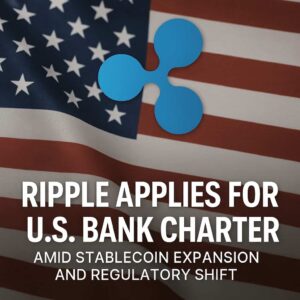 San Francisco, July 3, 2025 — In a move signaling deeper alignment with traditional finance, crypto firm Ripple has submitted an application for a national bank charter in the United States, CEO Brad Garlinghouse announced Wednesday. The application, confirmed by the Office of the Comptroller of the Currency (OCC), positions Ripple alongside stablecoin leader Circle in seeking official banking status amid growing calls for regulatory clarity.
San Francisco, July 3, 2025 — In a move signaling deeper alignment with traditional finance, crypto firm Ripple has submitted an application for a national bank charter in the United States, CEO Brad Garlinghouse announced Wednesday. The application, confirmed by the Office of the Comptroller of the Currency (OCC), positions Ripple alongside stablecoin leader Circle in seeking official banking status amid growing calls for regulatory clarity.
Ripple’s strategic application aims to streamline payment settlements and reduce dependency on intermediary banks, a shift that could enhance cost-efficiency and operational speed. If approved, the charter would also serve as a major step toward legitimacy for Ripple, which has faced longstanding regulatory scrutiny in the U.S.
In addition to the OCC filing, Ripple is seeking a Federal Reserve master account, which would allow direct access to the central bank’s payments infrastructure and enable the firm to hold reserves for its stablecoin, RLUSD, with the Fed. RLUSD, launched in October 2024, has grown to a market capitalization of approximately $470 million, placing it among the top stablecoins globally.
The move follows a similar announcement by Circle earlier this week, which revealed plans to establish a national trust bank following its successful IPO. These developments reflect a broader trend in the crypto sector toward regulatory integration and alignment with mainstream financial institutions.
Momentum for stablecoins has also been buoyed by recent legislative progress, notably the U.S. Senate’s passage of the GENIUS Act. Industry experts say the act introduces a more defined regulatory framework, potentially accelerating stablecoin adoption while safeguarding consumer interests.
“The GENIUS Act offers a critical foundation for responsible growth of stablecoins in the U.S.,” said analysts at digital asset manager Grayscale. “It represents a turning point for the sector’s regulatory maturity.”
With regulatory winds shifting and major crypto players pursuing bank-level infrastructure, Ripple’s latest move underscores the industry’s evolution from disruption toward institutional integration.




